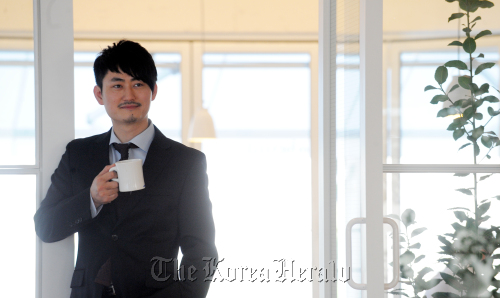Gentle and handsome, Jeon Yong is a one-time Korea Barista Champion. After capturing the championship title, he prepared to compete at the world championships, but his hopes of competing in the world event were soon dashed. He lost the chance to take to the world stage due to the internal divisions of the national association, which forfeited his advancement to the championships.
He remains bitter over his shattered dream, though he tries to live up to his reputation as barista champion of Korea. He is currently a manager at a cafe in Hannam-dong, Seoul.
“I was supposed to compete at the World Barista Championships in 2007, as I won the national title, but I ended up becoming the only champion in history who has been deprived of the opportunity to compete on the world stage,” Jeon told The Korea Herald.
The upsetting situation took place during the initial stages of formalizing the industry’s certificates, institutions, and hosting of the championships in Korea. A large number of organizations frantically lobbied to acquire “the official entitlement” to host the Korean championships. In his case, a more powerful group nullified the former event in which he had competed, and then created a whole new event of its own that produced another barista champion for the same year. The group qualified the winner of its event for the world championship, forfeiting Jeon’s championship title.
He remains bitter over his shattered dream, though he tries to live up to his reputation as barista champion of Korea. He is currently a manager at a cafe in Hannam-dong, Seoul.
“I was supposed to compete at the World Barista Championships in 2007, as I won the national title, but I ended up becoming the only champion in history who has been deprived of the opportunity to compete on the world stage,” Jeon told The Korea Herald.
The upsetting situation took place during the initial stages of formalizing the industry’s certificates, institutions, and hosting of the championships in Korea. A large number of organizations frantically lobbied to acquire “the official entitlement” to host the Korean championships. In his case, a more powerful group nullified the former event in which he had competed, and then created a whole new event of its own that produced another barista champion for the same year. The group qualified the winner of its event for the world championship, forfeiting Jeon’s championship title.

“Much like the factional strife in the sports industry, where an athlete’s chance to advance to the next round depends on his or he supporting faction, the coffee industry was built upon a similar structure too, unfortunately. And I fell victim to the power struggle,” he explained.
Problems do not only have to do with the championship title in Korea. Barista certificates have been another messy issue in the industry for years.
Getting certified as a barista has become much like the process for getting a driver’s license ― fast and easy to get. A six-month prep course and a 1.5 million won payment seem to be what it takes to become a barista these days.
“Basically, anybody can become a certified barista these days, and usually people after retirement or people laid off from jobs apply to become a barista in order to set up a caf of their own ― it’s that easy, and that unprofessional to become a barista these days,” he said.
He added, “A six-month course does not make one a real barista. Baristas are professionals who have slowly gained their know-how over many years and have the spirit of craftsmanship. But something is going wrong in the industry.” He believes, however, there is a more severe problem spreading through franchised coffee shops.
“They are too commercialized and completely overpriced,” the 10-year veteran barista said.
“Coffee is being globalized by the American standard. Coffee is a culture that the Italians have cultivated over hundreds of years. It’s a pride they have, but the American franchise coffee shops have completely distorted the originality ― let’s say Korean kimchi is being spread to the world with the Japanese word ‘ki-mu-chi’ ― that is not what we can call cultural diversity, but a distortion of a tradition. That is what is happening to coffee these days ― becoming like ‘ki-mu-chi.’”
“It is just unfair,” he said, as he talked about the recent BBC documentary feature “Black Gold” that revealed that for every $3 coffee we pay for, those who actually plant them get 3 cents. “The big franchises completely disregard the effort and time farmers put into growing coffee ― the market is disparaging the value of their work.” Jeon says he abhors the distribution cycle that “gives too little to the people who really deserves the most,”
The barista activist who fights for a “fair price” argues for a drastic shift in the coffee industry. “As long as loyalty does not take up so much of what customers pay, that’s fine,” he said. However, if a larger portion of money goes to the franchise and not to the farmers, the money flows into the wrong pocket, he said.
Meanwhile, Starbucks Corp., the world’s biggest coffee chain, announced its plans to more than double the rate at which it opens stores to an average of more than one a day.
By Hwang Jurie (jurie777@heraldcorp.com)




![[Herald Interview] 'Amid aging population, Korea to invite more young professionals from overseas'](http://res.heraldm.com/phpwas/restmb_idxmake.php?idx=644&simg=/content/image/2024/04/24/20240424050844_0.jpg&u=20240424200058)











![[KH Explains] Korean shipbuilding stocks rally: Real growth or bubble?](http://res.heraldm.com/phpwas/restmb_idxmake.php?idx=652&simg=/content/image/2024/04/25/20240425050656_0.jpg&u=)

